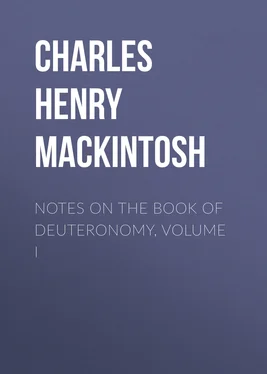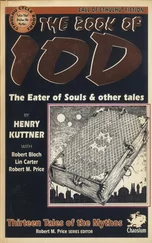Charles Henry Mackintosh - Notes on the Book of Deuteronomy, Volume I
Здесь есть возможность читать онлайн «Charles Henry Mackintosh - Notes on the Book of Deuteronomy, Volume I» — ознакомительный отрывок электронной книги совершенно бесплатно, а после прочтения отрывка купить полную версию. В некоторых случаях можно слушать аудио, скачать через торрент в формате fb2 и присутствует краткое содержание. Жанр: foreign_prose, foreign_antique, на английском языке. Описание произведения, (предисловие) а так же отзывы посетителей доступны на портале библиотеки ЛибКат.
- Название:Notes on the Book of Deuteronomy, Volume I
- Автор:
- Жанр:
- Год:неизвестен
- ISBN:нет данных
- Рейтинг книги:4 / 5. Голосов: 1
-
Избранное:Добавить в избранное
- Отзывы:
-
Ваша оценка:
- 80
- 1
- 2
- 3
- 4
- 5
Notes on the Book of Deuteronomy, Volume I: краткое содержание, описание и аннотация
Предлагаем к чтению аннотацию, описание, краткое содержание или предисловие (зависит от того, что написал сам автор книги «Notes on the Book of Deuteronomy, Volume I»). Если вы не нашли необходимую информацию о книге — напишите в комментариях, мы постараемся отыскать её.
Notes on the Book of Deuteronomy, Volume I — читать онлайн ознакомительный отрывок
Ниже представлен текст книги, разбитый по страницам. Система сохранения места последней прочитанной страницы, позволяет с удобством читать онлайн бесплатно книгу «Notes on the Book of Deuteronomy, Volume I», без необходимости каждый раз заново искать на чём Вы остановились. Поставьте закладку, и сможете в любой момент перейти на страницу, на которой закончили чтение.
Интервал:
Закладка:
To all this style of argument we have one brief and pointed reply. Of all these learned infidels we simply say, They know nothing whatever about the matter. They may be very learned, very clever, very deep and original thinkers, well made up in general literature, very competent to give an opinion on any subject within the domain of natural and moral philosophy, very able to discuss any scientific question; moreover, they may be very amiable in private life—truly estimable characters—kind, benevolent, philanthropic, beloved in private and respected in public,—all this they may be, but being unconverted, and not having the Spirit of God, they are wholly unfit to form, much less to give, a judgment on the subject of holy Scripture. If any one wholly ignorant of astronomy were to presume to sit in judgment on the principles of the Copernican system, these very men of whom we speak would at once pronounce him utterly incompetent to speak, and unworthy to be heard on such a subject. In short, no one has any right whatever to offer an opinion on a matter with which he is unacquainted. This is an admitted principle on all hands; and therefore its application in the case now before us cannot justly be called in question.
Now, the inspired apostle tells us, in his first epistle to the Corinthians, that "the natural man receiveth not the things of the Spirit of God; for they are foolishness unto him; neither can he know them , because they are spiritually discerned." This is conclusive. He speaks of man in his natural state, be he ever so learned, ever so cultivated. He is not speaking of any special class of men, but simply of man in his unconverted state—man destitute of the Spirit of God. Some may imagine that the apostle refers to man in a state of barbarism, or savage ignorance. By no means; it is simply man in nature, be he a learned philosopher or an ignorant clown. "He cannot know the things of the Spirit of God." How, then, can he form or give a judgment as to the Word of God? How can he take it upon him to say what is or what is not worthy of God to write? And if he is audacious enough to do so (as, alas! he is), who will be foolish enough to listen to him? His arguments are baseless, his theories worthless, his books only fit for the wastepaper basket; and all this, be it observed, on the universally admitted principle above stated, that no one has any title to be heard on a subject of which he is wholly ignorant.
In this way we dispose of the whole tribe of infidel writers. Who would think of listening to a blind man on the subject of light and shade? And yet such a man has much more claim to be heard than an unconverted man on the subject of inspiration. Human learning, however extensive and varied—human wisdom, however profound, cannot qualify a man to form a judgment upon the Word of God. No doubt a scholar may examine and collate MSS. simply as a matter of criticism; he may be able to form a judgment as to the question of authority for any particular reading of a passage; but this is a different matter altogether from an infidel writer undertaking to pronounce judgment upon the revelation which God has, in His infinite goodness, given to us. We maintain that no man can do this. It is only by the Spirit, who Himself inspired the holy Scriptures, that those Scriptures can be understood and appreciated. The Word of God must be received upon its own authority. If man can judge it or reason upon it, it is not the Word of God at all. Has God given us a revelation, or has He not? If He has, it must be absolutely perfect in every respect; and being such, it must be entirely beyond the range of human judgment. Man is no more competent to judge Scripture than he is to judge God. The Scriptures judge man; not man the Scriptures.
This makes all the difference. Nothing can be more miserably contemptible than the books which infidels write against the Bible. Every page, every paragraph, every sentence, only goes to illustrate the truth of the apostle's statement, that "the natural man receiveth not the things of the Spirit of God; … neither can he know them , because they are spiritually discerned." Their gross ignorance of the subject with which they undertake to deal is only equaled by their self-confidence. Of their irreverence we say nothing; for who would think of looking for reverence in the writings of infidels? We might perhaps look for a little modesty were it not that we are fully aware of the bitter animus which lies at the root of all such writings, and renders them utterly unworthy of a moment's consideration. Other books may have a dispassionate examination; but the precious book of God is approached with the foregone conclusion that it is not a divine revelation, because, forsooth, infidels tell us that God could not give us a written revelation of His mind.
How strange! Men can give us a revelation of their thoughts (and infidels have done so pretty plainly), but God cannot! What folly! What presumption! Why, we may lawfully inquire, could not God reveal His mind to His creatures? Why should it be thought a thing incredible? For no reason whatever, but because infidels would have it so. The wish is, in this case assuredly, father to the thought. The question raised by the old serpent in the garden of Eden nearly six thousand years ago, has been passed on from age to age by all sorts of skeptics, rationalists, and infidels, namely, "Hath God said?" We reply, with intense delight, Yes; blessed be His holy name, He has spoken—spoken to us. He has revealed His mind; He has given us the holy Scriptures. " All scripture is given by inspiration of God , and is profitable for doctrine, for reproof, for correction, for instruction in righteousness; that the man of God may be perfect [αρτιος], thoroughly furnished unto all good works." And again, "Whatsoever things were written aforetime were written for our learning, that we through patience and comfort of the Scriptures might have hope." (2 Tim. iii. 16, 17; Rom. xv. 4.)
The Lord be praised for such words! They assure us that all Scripture is given of God, and that all Scripture is given to us. Precious link between the soul and God! What tongue can tell the value of such a link? God has spoken—spoken to us. His Word is a rock against which all the waves of infidel thought dash themselves in contemptible impotency, leaving it in its own divine strength and eternal stability. Nothing can touch the Word of God. Not all the powers of earth and hell, men and devils combined can ever move the Word of God. There it stands, in its own moral glory, spite of all the assaults of the enemy, from age to age. "Forever, O Lord, Thy Word is settled in heaven." "Thou hast magnified Thy Word above all Thy name." What remains for us? Just this: "Thy Word have I hid in my heart, that I might not sin against Thee." Here lies the deep secret of peace. The heart is linked to the throne—yea, to the very heart of God by means of His most precious Word, and is thus put in possession of a peace which the world can neither give nor take away. What can all the theories, the reasonings, and the arguments of infidels effect? Just nothing. They are esteemed as the dust of the summer threshing-floor. To one who has really learnt, through grace, to confide in the Word of God—to rest on the authority of holy Scripture, all the infidel books that ever were written are utterly worthless, pointless, powerless; they display the ignorance and terrible presumption of the writers; but as to Scripture, they leave it just where it ever has been and ever will be—"settled in heaven," as immovable as the throne of God. 2 2 In referring to infidel writers, we should bear in mind that by far the most dangerous of such are those calling themselves Christians. In our young days, whenever we heard the word "infidel," we at once thought of a Tom Paine or a Voltaire; now, alas! we have to think of so-called bishops and doctors of the professing church. Tremendous fact!
The assaults of infidels cannot touch the throne of God, neither can they touch His Word; and, blessed be His name, neither can they touch the peace that flows through the heart that rests on that imperishable foundation. "Great peace have they that love Thy law, and nothing shall offend them." "The Word of our God shall stand forever." "All flesh is as grass, and all the glory of man as the flower of grass. The grass withereth, and the flower thereof falleth away; but the Word of the Lord endureth forever. And this is the Word which by the gospel is preached unto you." (1 Pet. i. 24, 25.)
Интервал:
Закладка:
Похожие книги на «Notes on the Book of Deuteronomy, Volume I»
Представляем Вашему вниманию похожие книги на «Notes on the Book of Deuteronomy, Volume I» списком для выбора. Мы отобрали схожую по названию и смыслу литературу в надежде предоставить читателям больше вариантов отыскать новые, интересные, ещё непрочитанные произведения.
Обсуждение, отзывы о книге «Notes on the Book of Deuteronomy, Volume I» и просто собственные мнения читателей. Оставьте ваши комментарии, напишите, что Вы думаете о произведении, его смысле или главных героях. Укажите что конкретно понравилось, а что нет, и почему Вы так считаете.












